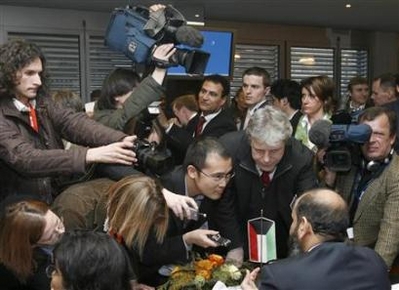OPEC keeps oil output steady
(Agencies)
Updated: 2008-03-05 21:13
Updated: 2008-03-05 21:13
VIENNA -- OPEC ministers on Wednesday agreed to keep output steady and said record high prices had been driven by factors that were beyond their control.
 Journalists face Acting Kuwaiti Oil Minister Mohammad al-Olaim (R) at the beginning of a meeting in OPEC's headquarters in Vienna March 5, 2008. [Agencies] |
US crude hit a record of $103.95 a barrel on Monday and was trading above $100 on Wednesday.
Washington has said even a token supply increase from the Organization of the Petroleum Exporting Countries would help to tame prices and contain any impact on a fragile world economy.
But OPEC ministers have repeatedly said the oil market has been driven upwards by factors such as a weak dollar, speculation and political strife, and not by a lack of crude.
After less than two hours of talks, OPEC delegates told Reuters the group had reached agreement to keep supplies steady.
The ministerial meeting continued discussing other matters after the decision had been reached.
Nigerian Minister of State for Oil Odein Ajumogobia said before the meeting started he believed output should be kept steady, although he said oil above $100 was uncomfortable and above $80 a barrel was high.
"The OPEC official position has been anything above $80 is on the high side," he told reporters.
Behind the Scenes ChangesWednesday's no-change decision could still allow for quiet shifts in OPEC production.
Top exporter Saudi Arabia has consistently pledged to keep the market well-supplied with oil.
Saudi Arabian Oil Minister Ali al-Naimi said the kingdom had been pumping 9.2 million barrels per day (bpd) "day in, day out," which is roughly 300,000 bpd above its formal OPEC output target.
Piling the pressure on OPEC, Washington said on Tuesday a modest output increase of 300,000 bpd to 500,000 bpd could calm prices and help to limit any economic damage.
"I think it's a mistake to have your biggest customer's economy to slow down ... as a result of high energy prices," President George W. Bush said on Tuesday.
Given they do not believe oil prices have been driven higher by a lack of crude, OPEC ministers have been skeptical that an output increase would have any impact on the market.
OPEC last decided to raise its production in September 2007 and that decision did not halt the oil price rally, OPEC President Chakib Khelil has noted.
Together with other ministers, he has said crude stock levels could build during the second quarter when consumption typically tapers off after the end of winter.
He has also said a seasonal decline in demand could be exaggerated by the impact of economic slowdown.
The exporter group's 13 members, who pump more than a third of the world's oil, could have an opportunity to reassess the market at producer-consumer talks in Rome on April 20-22.
|
|
|
||
|
||
|
|
|
|